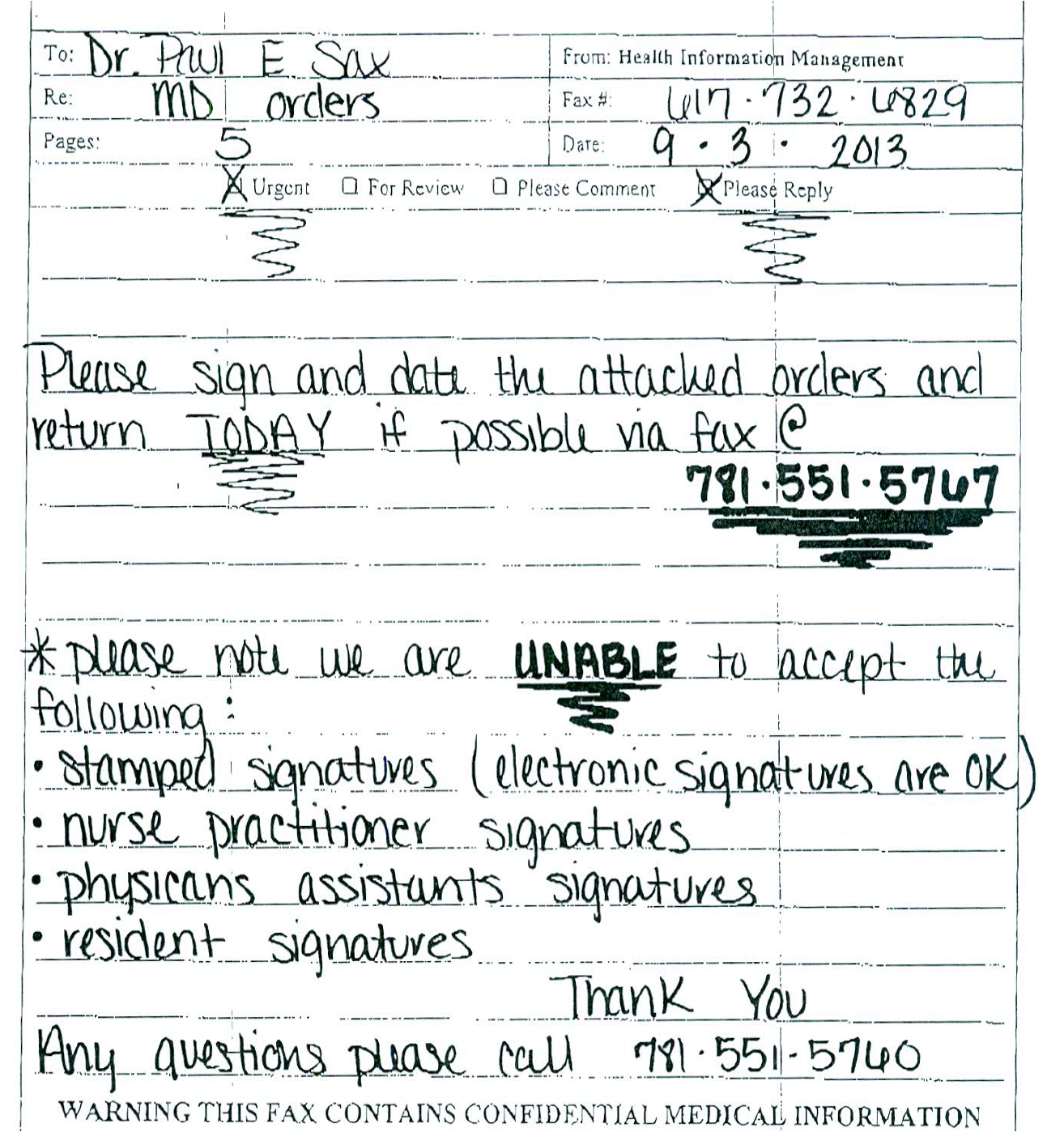Advertisement
How Do Doctors Hate Paperwork? Let Us Count The Ways
Everyone hates mindless paperwork.
But certain types are particularly annoying, seemingly designed to send you screaming into the night, dragging a broken fax machine behind you as your brain explodes.
Too strong? Take a look at this fax cover sheet I recently received about a patient who had been receiving IV antibiotics at home:

To get at the root of why this particular communication rankles so, let's do a close reading of the cover sheet — an explication, a detailed description of the prosody and narrative arc, to borrow some words from my English-major days.
Starting at the top, working down:
- It's from "Health Information Management": Even though names have changed a lot over the years — hardly anyone was named "Sophia" or "Emma" back when I was a kid — it's highly unlikely that "Health Information Management" is the name of the person who sent this handwritten note.
- It's 5 pages. Pages 1 is this cover sheet. Pages 2, 3, and 4 are boilerplate documentation of what has already been done. And page #5 is a task that raises paperwork to a new level of torture — it asks for my signature in 4 ways: 1) Slow signature; 2) Fast signature; 3) Initials; 4) Printed name. That's a first for me, let's hope it's the last.
- It's "Urgent." Not just Urgent, but urgent!!! How do we know? Look, the word has squiggly underlining — that means it must be really important. But one might wonder why it's so important when, as mentioned above, the care has already been given (and, for the record, the patient no longer needs their services, he's much improved). Could it be that that the definition of "urgent" for this company differs quite substantially from a clinician's? To a clinician, examples of "urgent" problems include a patient who is short of breath, or bleeding, or having chest pain. For this company, "urgent" means "we want to be paid as soon as possible."
- They want it "TODAY." See above, for "urgent", though now they've brought out the all-caps, along with the same squiggly underlining. Clearly, they want me to stop whatever I'm doing and sign the form — 4 times — NOW. One company admitted they stamp all their forms "SECOND REQUEST!!!" — even first requests — as they found this made doctors respond more rapidly to their queries. Sneaky.
- This is all happening by fax. The fax machine is a virtually obsolete form of communication, soon to take its place besides dial phones, signal flags, and smoke signals. But not for home care companies — they love fax machines. They love them so much that the fax number doesn't just have the squiggly underlining, it also is BOLDED. I can just imagine the office where Health Information Management sits — wall-to-wall fax machines, each carefully monitored, and each shrill fax tone a thrilling announcement that a doctor's signed (4 times) order is incoming. What joy. (Small aside about fax machines: Over the telephone, "Sax" sounds just like "fax" — which meant back in the heyday of fax machines in the 1990s, I received plenty of correspondence — even faxes — to a "Dr. Fax.")
- They are unable to accept certain signatures. No stamps. No signatures from NPs or PAs. Nothing from residents. In case it's not clear, they've done something very special with the word "unable" — the triple-whammy of ALL-CAPS, BOLD, and of course our friend the squiggly underline. Must be very important. But think about this for a moment: Can't residents write orders in the hospital? Prescribe medications to their outpatients? Do various procedures? And PAs and NPs do routine office visits, plus more complex tasks such as covering inpatient medical and surgical services, even performing colonoscopies. So residents, PAs and NPs can do these things — and do them well — but they can't sign these forms? Maybe the PA and NP curricula don't include the special class we MDs took on how to sign our name 4 different ways (slow, fast, initials, and print). And that special class isn't given to just any MD — just those who are board-certified, credentialed, and have completed their post-graduate training. I'd go so far as to say that our ability to sign these forms (4 times) is the true meaning of working to the highest level of our esteemed MD degrees.
OK, I'll stop now.
This post first appeared on the NEJM Journal Watch blog HIV and ID Observations here, under the headline "A Detailed Analysis of Paperwork, and the Special Power of the MD Degree."